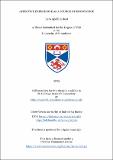Files in this item
Affective experience as a source of knowledge
Item metadata
| dc.contributor.advisor | Snedegar, Justin | |
| dc.contributor.advisor | Dutilh Novaes, Catarina | |
| dc.contributor.advisor | Duncan Kerr, Alison | |
| dc.contributor.author | Jost, Lara Apolline | |
| dc.coverage.spatial | 181 | en_US |
| dc.date.accessioned | 2023-04-07T12:38:29Z | |
| dc.date.available | 2023-04-07T12:38:29Z | |
| dc.date.issued | 2023-06-12 | |
| dc.identifier.uri | https://hdl.handle.net/10023/27364 | |
| dc.description.abstract | In analytic philosophy, appropriate sources of knowledge do not include affective experience. In this thesis, I oppose this commonly accepted view and argue in favour of valuing the contribution of affective experience to knowledge. My argument unfolds in two parts. In the first part of the thesis, I propose a positive argument favouring the inclusion of affective experience in our sources of knowledge. My main contribution is the Reflective Model, a novel account of affective experience as a source which responds to the common objections towards the epistemic value of affective experience. This new model is built on the idea that affective experience is a reason- tracking ability, which incorporates a reflective element through internal and social calibration. I illustrate this phenomenon by discussing how members from marginalised groups identify microaggressions through their emotions. In the second part of the thesis, I offer a negative argument: given the negative ethical and practical consequences of excluding affective experience, we should include it in our sources of knowledge. I conceptualise a new form of epistemic injustice, source based epistemic injustice, which highlights unfairness towards knowers who utilise unapproved sources of knowledge like affective experience. In addition, I discuss two applied cases where testimony based on affective experience is unfairly downgraded: testimony about lesser-known illnesses and testimony about everyday racism. I argue that the first case leads to the epistemic exploitation of patients, whilst the second gives rise to dialectical white scepticism, a pernicious form of white scepticism which has not been previously theorised. Altogether, I argue that legitimising affective experience as a source of knowledge would enable us to incorporate a greater number of epistemic contributions in our epistemological system, thus reducing instances of injustice and silencing experienced by members of marginalised groups. | en_US |
| dc.language.iso | en | en_US |
| dc.rights | Creative Commons Attribution-NonCommercial-NoDerivatives 4.0 International | * |
| dc.rights.uri | http://creativecommons.org/licenses/by-nc-nd/4.0/ | * |
| dc.subject | Emotion | en_US |
| dc.subject | Epistemology | en_US |
| dc.subject | Affective experience | en_US |
| dc.subject | Feminist philosophy | en_US |
| dc.subject | Medical ethics | en_US |
| dc.subject | Epistemic injustice | en_US |
| dc.subject | Knowledge | en_US |
| dc.subject | Microaggressions | en_US |
| dc.subject | Endometriosis | en_US |
| dc.subject | Testimony | en_US |
| dc.subject.lcc | BD181.J78 | |
| dc.subject.lcsh | Knowledge, Theory of | en |
| dc.subject.lcsh | Experience | en |
| dc.subject.lcsh | Emotions (Philosophy) | en |
| dc.subject.lcsh | Feminist theory | en |
| dc.title | Affective experience as a source of knowledge | en_US |
| dc.type | Thesis | en_US |
| dc.contributor.sponsor | AD Links Foundation | en_US |
| dc.contributor.sponsor | Fondation Znedek et Michaela Bakala | en_US |
| dc.type.qualificationlevel | Doctoral | en_US |
| dc.type.qualificationname | PhD Doctor of Philosophy | en_US |
| dc.publisher.institution | The University of St Andrews | en_US |
| dc.publisher.department | University of Stirling | en_US |
| dc.identifier.doi | https://doi.org/10.17630/sta/387 |
The following licence files are associated with this item:
This item appears in the following Collection(s)
Except where otherwise noted within the work, this item's licence for re-use is described as Creative Commons Attribution-NonCommercial-NoDerivatives 4.0 International
Items in the St Andrews Research Repository are protected by copyright, with all rights reserved, unless otherwise indicated.


